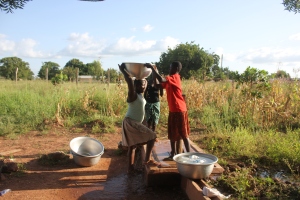The afternoons are filled with images of young girls balancing basins of water on their heads, the weight threatening to snap their slender necks with every step. They gather for hours at the borehole after school, pumping away until their arms are exhausted and their palms are calloused. Each takes a turn in helping another to lift the metal containers onto a cloth used to protect the closely shaved scalp of the carrier, desperately trying not to spill even one precious drop of water that she labored so hard to obtain. These girls fetch water in this manner every day in order to provide enough for bathing, cooking, cleaning, and drinking for the entire family. During the rainy season, every bucket, basin, and bowl in the house is left outside during the downpours to collect water and spare the girls at least a few trips that day. The rest of the year, however, offers no relief from the scorching sun and dusty roads of Ghana.
A borehole is basically a deep well with a pumping mechanism installed to provide a closed circuit protected from contamination. Each borehole is meant to serve up to three hundred people, and is placed at strategic locations in an attempt to reach as many households as possible. Still, there are houses that are at least a half-mile walk from the nearest borehole, which means a round-trip of a mile in order to fetch one basin of water. While this may seem a very antiquated method of water distribution, in a tiny rural village, the likelihood of piped water being installed any time soon is dismal.
In a place without running water, a toilet is a hole in the ground and bathing means filling a bucket and using a smaller container to pour the water cup-by-cup over your head. Most Ghanaians can get sufficiently clean with about half a bucket; imagine the amount of water you use while taking a fifteen-minute shower. When turning a handle provides a seemingly infinite amount of water, this fact suddenly becomes very easy to forget.
In addition to being an inconvenience and somewhat tedious, the lack of water creates a web of negative impacts that extend into different aspects of community life. If running water were to be brought to Eremon, afternoon hours could be used for studying instead of fetching water. Diseases spread due to poor sanitation could be curbed, resulting in higher personal productivity and lower medical costs. Simple personal hygiene would improve, leading to healthier living and improved quality of life.
The lack of reliable access to clean water is by far the largest of many obstacles presented by life in Ghana, but it is a slow step-by-step process to approach water-related goals. Building pit latrines to prevent open defecation and encouraging the use of covered water containers are only small victories. The hope is that eventually, running water will extend to this village, but it will require education, motivation, and resources to do so.
